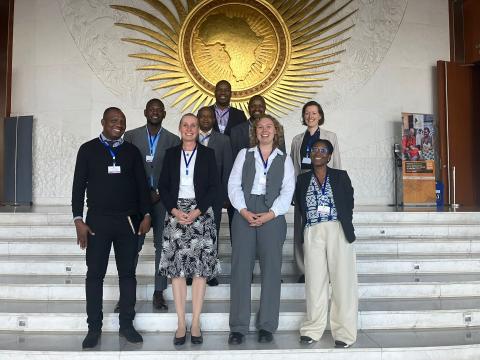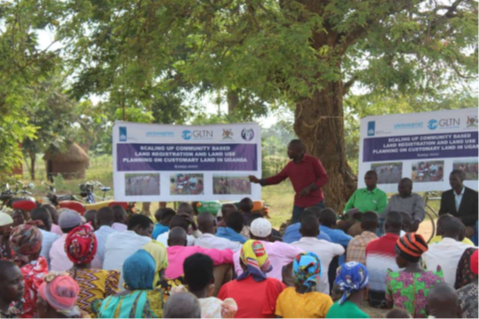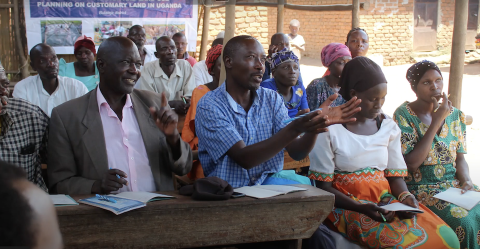Discover hidden stories and unheard voices on land governance issues from around the world. This is where the Land Portal community shares activities, experiences, challenges and successes.
 Follow our
Follow our
Sustainable Development Goals
Blog Series!
Interested in land corruption?
Follow our Land & Corruption Blog Series
for in-depth perspectives from the experts.
Issues
Geographical focus
Photo credit: LAND-at-scale
On February 27, 2025, the Land Portal Foundation hosted an insightful webinar on Exploring Sustainable Financing of Land Registration and Land Governance. As financial sustainability remains a major challenge for land administration systems worldwide, experts from Burundi, Uganda, Somalia, and international institutions shared their experiences and strategies to transition from donor-dependent models to self-sustaining financing mechanisms.
Photo: Kandukuru Nagarjun, via Flickr, CC BY 2.0
The recent series of ALIGN articles shed light on how civil society, impacted communities and rights defenders across the world have used strategies such as legal action, publishing of mining contracts and stakeholder dialogues to change approaches to land-based investment governance.
The Land Portal Foundation, in partnership with Transparency International, hosted the webinar titled "Breaking New Ground: Insights and Stories on the Impact of Land Corruption on Discriminated Groups in Africa." The webinar brought together a panel of distinguished experts to delve into the challenges and complexities of corruption intertwined with discrimination in land rights and governance. This session provided crucial insights through detailed case studies and expert analyses, offering pathways towards more equitable land management practices.
Organized by the Cadasta Foundation, Land Conflict Watch, the Land Portal Foundation, National Council of Applied Economic Research (NCAER) of India, and NRMC Center for Land Governance, the webinar "The Digitization of Land Records: A Panacea for Land Conflicts" provided an in-depth look at the critical role digitization of land records plays in addressing land disputes in India.
Introduction
As part of a scoping study titled Land Governance for Climate Resilience: A review and case studies from LAND-at-scale projects headed by Richard Sliuzas, Emeritus Professor, University of Twente, GLTN dove into the links between climate and land governance in the ‘’Scaling up community-based land registration and land use planning on customary land in Uganda’’ project. This case study highlights experiences from the community-based wetland man
On the opening day of #COP28, we hosted a webinar, “Building Climate Resilience through Inclusive Land Governance,” that delved into the crucial role which inclusive land governance plays in building climate resilience.
Scaling is at the heart of both the name as well as the strategy of LAND-at-scale. Scaling and scaling potential are key in the way the program was designed and is reflected in the three pillars chosen to realize the aim of the program. The first pillar is about scaling successful initiatives and projects; the second pillar focuses on land governance innovations with scaling potential; and the third pillar covers knowledge management, with a focus on gaining a deeper understanding on the conditions required to make scaling successful.
Communities in developing countries are increasingly exposed to the effects of climate change. Although they contribute little to greenhouse gas emissions, many communities are at the forefront of climate change and the associated extreme events. They are faced with events that undermine their food security, such as droughts and floods, but also increased pressure on land due to climate-induced migration. In this session, we delved into the nexus of climate change and land governance.
Today, I am on board the Greenpeace Arctic Sunrise ship, as we confront the fossil fuel company, Shell, for its role in causing climate devastation around the world - while paying nothing for this destruction. It is now a trend almost everywhere in the world, fossil fuel and oil extraction are becoming the new trend and a real treasure, to a chosen few. True, governments do need money, and it seems easier and quicker for them to have it through the exploitation of fossil fuels.
Uganda’s extractives industry is growing exponentially and attracting both foreign and domestic mining companies. But too often, mineral-rich communities fail to benefit. Here, Kevin Bakulumpagi of ANARDE, Uganda discusses how Community Development Agreements can ensure affected communities both benefit from mining operations and are meaningfully engaged in agreements regulating mining activities.
Between 2021 and 2022, mining and quarrying activities in Uganda recorded a gross value added of 40,076 billion Uganda shillings – contributing 27.1% to its GDP. Whereas these country statistics seem attractive, the interests of mining-affected communities are often ignored, resulting in frequent community–investor tension and conflicts. Deeper and more meaningful engagement is needed to sustain the industry.
On 14th October 2022, the Ugandan government signed into law the Mining and Minerals Act 2022 to better regulate the industry and distribute benefits from mining activities. The act introduces the use of Community Development Agreements (CDAs) to enhance local community development and welfare while empowering communities to negotiate for more sustainable and beneficial arrangements.
Advocates for Natural Resources and Development (ANARDE), together with IIED and the Columbia Center on Sustainable Investment (CCSI) have advocated not only for the use but also the regulation of CDAs. We have supported the government with valuable inputs to ensure the interests of mining-affected communities are well represented.
Challenges with the current legal framework
Uganda’s legal framework on mining did not provide clear mechanisms for community engagement or finding consensus. Instead, mining companies already engaging with impacted communities – which are by no means all of them – do so on a case-by-case basis, privately working with local governments, community leaders or community trusts. In addition, most of the engagements are only voluntary or optional arrangements and are treated as Corporate Social Responsibility or certification requirements.
Most of these agreements are often non-binding or merely memoranda of understanding that are not legally binding. They are also often unplanned, lack transparency and vary from project to project with little means of enforcing agreed terms. Instead, engagements must be systematically institutionalised to ensure consistency, accountability and responsibility in company practice with corresponding repercussions for failure to fulfil their duties.
Why are Community Development Agreements important?
CDAs are legal arrangements made between investors and host communities and are viewed by government and other stakeholders as a mechanism to assist in the development and enhancement of community welfare through equitable revenue-sharing arrangements. Usually enforceable by all parties, CDAs provide a legal basis for communities to cement their arrangements with mineral rightsholders.
Mining companies are increasingly using CDAs to clearly define their relationships with and obligations to impacted communities. This helps to ensure that communities are not harmed by – and also benefit from – the value created by local large-scale investments.
CDAs also encourage the effective engagement with and participation of communities prior to any investment activities. CDAs facilitate access to information and encourage community-defined development outcomes, giving them an opportunity to shape the distribution of royalty payments, infrastructure development and other social benefits contributed by an investor.
By transferring some control from the government to impacted communities, CDAs empower communities to act – through legally enforceable agreements – should a company fail to deliver on its promises. The approach taken to CDAs will also have cross-sectoral significance for other large-scale land-based investments in fields such as agriculture and forestry.
Implementing CDAs in practice
With the law coming into force, CDAs have now become an integral part of the licensing process and a means to generate benefits for the community. For tangible results, however, significant efforts are needed to build capacity of all actors involved and to ensure that consultation and negotiation processes protect community rights. Much more work is needed if CDAs are to become more than mere legislative provisions:
-
New regulations must provide certainty and nuance about what is expected from all stakeholders, including companies, communities and the government, and
-
To ensure the provisions of the act are implemented effectively, it is crucial that institutional capacity and understanding is strengthened, that community capacity and awareness are enhanced, and that compliance and enforcement are closely monitored.
At ANARDE, we are supporting the Ugandan government in developing detailed regulations, drawing on our practical experience and engagement with communities in extractive-intense areas – such as Albertine Graben, Karamoja, Busia and Mubende – to develop proposed CDA regulations that complement provisions already in the Mining and Minerals Act 2022.
We further hope to assist the responsible institutions – such as the Ministry of Energy and Mineral Development and local governments – to anticipate potential challenges and close existing or potential gaps. By working in collaboration with the government, ANARDE also strives to amplify the voices of impacted communities and secure meaningful legal protections. But the law and supporting regulations are just the first steps. The processes used to reach substantive agreements are almost as important as the agreements themselves. There is a need to build further on what the law states to generate an organic approach for Uganda to regulating CDAs.
We cannot overstate the importance of community involvement throughout the process from negotiation to implementation and thereafter closure. ANARDE is currently developing a toolkit for communities to ensure robust processes are followed in practice. We are also working to raise awareness and provide training on step-by-step negotiation processes and the election of representatives, among others.
Achieving change
We believe that the benefits from natural resources must be enjoyed by communities most impacted by extraction. CDAs that have been ushered in by the Mining and Mineral Act 2022 are an important vehicle to achieve this. But achieving change will require significant effort from all stakeholders to ensure that the interests of all community members are taken into account, that agreements reached are seen as legitimate, and that there are clear channels for enforcement, so that dispute resolution is at the centre of the interaction, and that human rights, royalties and local development obligations are upheld to realise the benefits for the community.
Moving forward, government officials need to be made aware of and address the difficulties caused by top-down business-as-usual approaches. Civil society organisations need to improve their skills and provide support and backstopping for communities in negotiations. Communities need to engage with the process and demand accountability. And companies need to ensure not only the procedures but also the intention behind CDAs is achieved. Most important of all, the voices and unique circumstances of each community must be heard.
Photo Credit: A resident of Moroto District expresses her views on the relevance of Community Development Agreements Community in an outreach session by ANARDE in Karamoja region (Photo: ANARDE)












